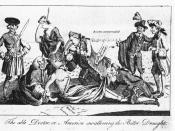Newcomb
APUSH per. 3
"British policy toward its American Colonies between 1763 and 1775 were justifiable." Assess the validity of this statement.
British policy towards its American colonies between 1763 and 1775 was not wholly justifiable. After a century of salutary neglect, intrusive taxes like The Sugar Act of 1764, The Stamp Act of 1765, and The Townshend Act of 1767 were an unjust ploy to pass the buck of England's debt to the colonies and even more outrageously, The Intolerable Acts of 1775 went so far as to quarter soldiers in the homes of colonists, close ports, undermine the colonial justice system and instate royal governors.
The first of the one-sided taxes imposed on the colonies was The Sugar Act headed by Prime Minister George Grenville; although a slight tax, the colonists were angered by the premise of British government enacting taxes upon them (Benson 1501-02). The Sugar Act targeted on cutting down smuggling, and taxed sugar, coffee, tea, and molasses- staples for America.
Grenville sought American contribution in payment of the debt brought on by the French and Indian war and assistance in the cost of colonial administration (O'Shaughnessy 244). This point fell flat for many colonists, who were left wondering what exactly the needed protection from besides their own mother country. This grievance would soon be overshadowed by the even less popular Stamp Act.
The Stamp Act of 1765 was truly detested in the Americas, as with it, came the popular motto of the colonies "No taxation without representation", meaning that since the colonies were not represented in parliament, taxes could not be passed on their behalf. The Stamp Act instated a tax on all paper goods, ranging from legal documents to pamphlets (Phelps 297-99). The almost instantaneous protest of the colonies surprised Parliament, and in an...


